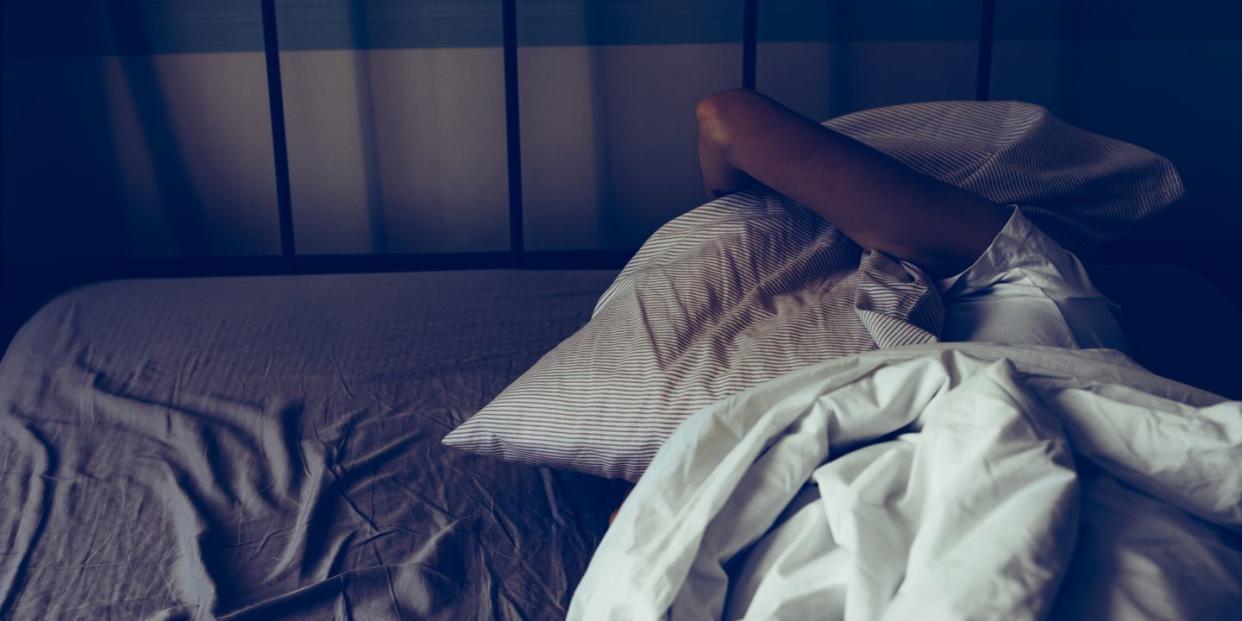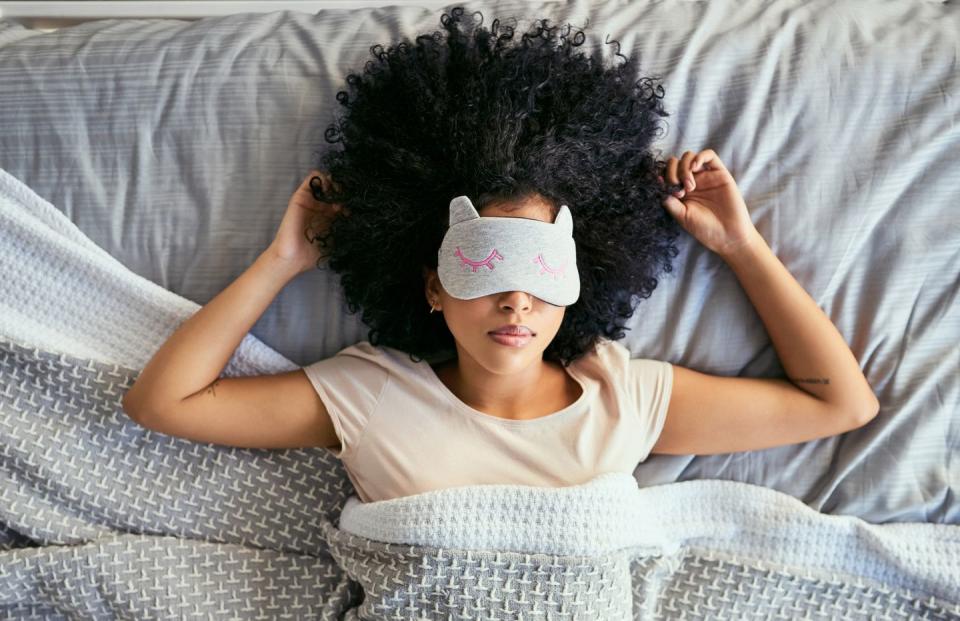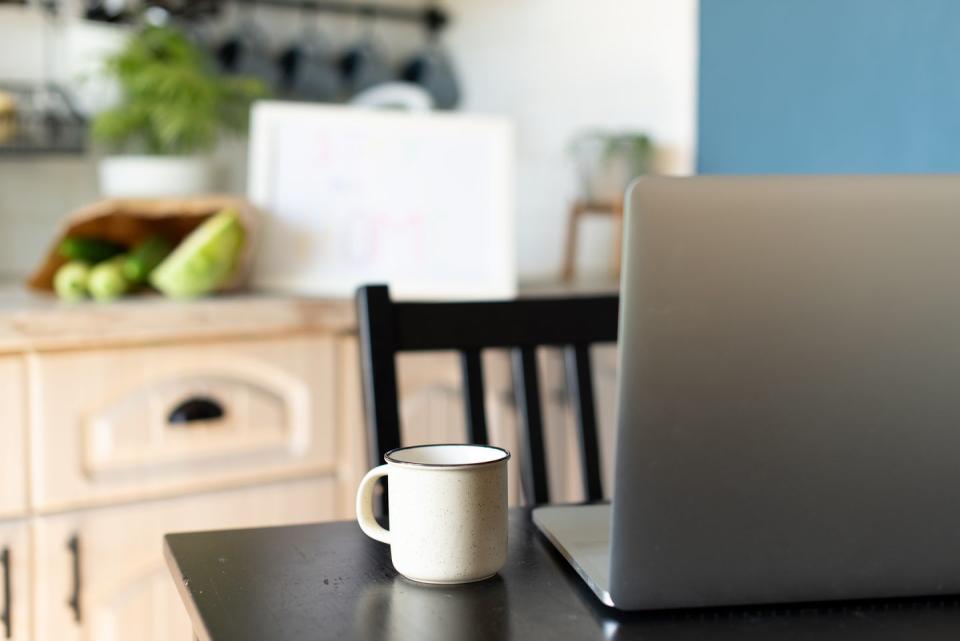Finally an answer on why your sleep becomes so disrupted in lockdown

The coronavirus pandemic has disrupted a lot of things over the past year; social plans, weddings, birthdays, career paths, holidays... the list goes on. And then there's sleep patterns, too, which for many people have pretty much gone out the window during lockdown.
If you're someone who's noticed they struggle with sleep during these now depressingly-familiar 'stay at home' periods, you most certainly aren't alone. Cambridge Sleep Sciences research found that 52% of UK adults take longer than 20 minutes to get to sleep, with sleep issues having a slightly bigger impact on women than men. And according to the experts, this is no coincidence; all the disruption is perhaps affecting you in ways you hadn't properly considered.
As part of the rules, we've been told to stay at home unless absolutely necessary. For most people, work routines look nothing like they did last year, parents are juggling home schooling, we're unable to see our family and friends, and it's only advisable to go out for some fresh air once a day. When it's put it like that, it's hard to see how it wouldn't impact some of our most fundamental bodily functions.
"Lack of routine, not getting up early, spending too much time at home and lack of daylight all lead to more time in bed, awake," explains Kathryn Pinkham, founder of The Insomnia Clinic. In turn, this creates "a connection between bed and wakefulness" that can be hard to break.

Then there's the impact stress is having on your sleep cycle. You might not be acutely aware the constant hum of stress, but it's likely that in such extraordinary circumstances (no matter how used to them you feel you've become), it's very much there. "Anxiety levels have risen due to the pandemic, and this has impacted sleep across the country," says Dr Chris Dickson, Executive Chairman of Cambridge Sleep Sciences. "For those who are working from their bedrooms, it may be harder for them to switch off at night as the brain has started to associate the bedroom with the stresses of work."
On top of that, the transformation of the working day for many, with earlier starts and later finishes, can make it harder to wind down. "People are napping more during the day because they are able to, and this is disrupting the body’s natural process of building its sleep pressure," says 'The Sleep Geek', James Wilson. Plus, there's the increased booze intake so many are having. "We are drinking more alcohol, which although makes us think we are asleep, gives us really poor quality sleep. Alcohol is a sedative, not a sleep inducer," the sleep expert notes.
All that might make it a bit clearer as to why you're having a hard time getting to sleep - and staying that way - but how can you help yourself overcome it? We asked the experts for their advice...
How to improve poor sleep during lockdown:
Spend less time in bed
Yes, you read that right. If you can't drift off, rather than staying in bed tossing and turning, sleep expert Kathryn Pinkham advocates just getting up for a bit. "If you wake or can’t sleep, leave your bed. Get up and out of bed, read a book for a little while and then when you’re feeling sleepy again, head back to bed. You should find you fall back to sleep far more easily." Expert sleep physiologist for LloydsPharmacy, Stephanie Romiszewski, agrees. "You do not want your brain getting used to you spending long periods of time awake in bed with a negative mind-set," she says, adding that "this technique only tends to work when repeated over time."
Get yourself into a new routine
Just because you're at home everyday with nowhere to be, doesn't mean you shouldn't still craft a routine to follow. "Developing a new rhythm, ideally one that we can continue, albeit a little modified, when lockdown ends, can further help to sleep well," suggests Dr Kat Lederle, head of sleep health at Somnia.
Work in a room that's not your bedroom (if possible)
It's a luxury to have space to move around at home, and not one everyone has access to. But if you are working from home right now, and you can find a space to work in that's not your bedroom - even if just for a portion of your working week - Cambridge Sleep Sciences' Dr Chris Dickson suggests doing it. As mentioned above, working in the bedroom can form an association between the sleep environment and the stresses of work. "For those fortunate enough to do so, I’d recommend working from another room," he says.

Choose carefully what you watch before bed
This might not be an issue for everyone, but sleep expert James Wilson, AKA The Sleep Geek, suggests: "Do not watch the news before bed!" You don't want your brain alive and thriving with worries, after all. Dr Nerina Ramlakhan, Silentnight’s resident sleep expert, agrees. "My best tip for people who are noticing they’re having a disrupted night’s sleep is to create a good bedtime routine and manage your fear response - avoid watching the news and going onto social media constantly," she says. Instead, the expert advises making "conscious decisions" about how often you’ll consume both. "Consciously choose to watch programmes and read books that uplift, inspire and make you laugh," Dr Nerina adds.
Try a sleep technique
Don't worry, it doesn't involve counting sheep. If you're finding your mind is racing with anxious, negative, or worrying thoughts come bedtime, consultant health psychologist Dr Sue Peacock suggests a simple technique that can help with 'thought stopping'. "Say the word 'the' every two seconds, and rarely will you get beyond five minutes before you are sleeping," explains the expert. "This works as it blocks your negative thoughts. Because the word 'the' does not mean anything or have any emotion attached to it, your mind will not wander."
Ditch your vices
We all know in theory why we should reduce our consumption of things like coffee and alcohol, but that doesn't always mean it gets put into practice. If your sleep is possibly suffering as a result, though, it's surely worth giving it a go. "Try to avoid alcohol, coffee or energy drinks later in the day, for example past late afternoon," says sleep physiologist Stephanie Romiszewski. "Instead you could opt for decaff options and drink plenty of water during the day." On that note, Dr Nerina suggests "eating your evening meals earlier in the day to avoid impacting on sleep quality."

Implement a new sleep pattern
Our bodies love regularity, you see. "Get up at the same time each day, seeking light and exercise as early as possible – this will help regulate sleep and keep you in a positive mind-set for the day," notes sleep expert Stephanie Romiszewski. Although you want to try to stick to a pattern as much as you can, she also advises not going to bed until you're actually sleepy. "Make sure you're tired, and what you're doing before bed is winding you down and is enjoyable."
Equipped with all this advice, fingers crossed you'll be sleeping soundly for the rest of lockdown!
The latest issue of Cosmopolitan UK is out now and you can SUBSCRIBE HERE.
Like this article? Sign up to our newsletter to get more articles like this delivered straight to your inbox.
You Might Also Like


